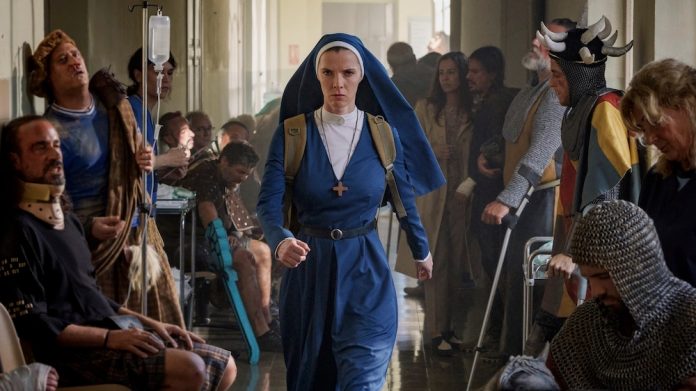A nun who takes “bride of Christ” literally, an algorithm with cult powers, a talisman that could destroy the world — this is the brave new world of Mrs. Davis, the acclaimed Peacock series that explores hot-button topics such as faith and artificial intelligence.
Created by executive producers Tara Hernandez (The Big Bang Theory) and Damon Lindelof (Lost), the eight-part series stars Betty Gilpin (GLOW) as Sister Simone, a daughter of magicians tasked with finding the Holy Grail. She’s joined on her mission by Wylie (Jake McDorman), a suicidal ex-boyfriend who leads a worldwide network of anti-AI terrorists. The series also stars Margo Martindale, David Arquette, Elizabeth Marvel, Ben Chaplin, and Chris Diamantopoulos.
Visually, Mrs. Davis received a boost from veteran TV helmer Owen Harris, who directed four of the episodes, including the pilot and finale. Harris got his start on Secret Diary of a Call Girl and went on to direct three installments of Black Mirror, including the Emmy-winning episode “San Junipero.” In addition to directing numerous commercials, Harris also helmed the first episode of Jordan Peele‘s Twilight Zone reboot and directed the indie crime comedy Kill Your Friends starring Nicholas Hoult and James Corden.
Above the Line recently spoke with Harris via Zoom, where he talked about establishing the world of Mrs. Davis and how the show is remarkably relevant at the moment given that we seem to be at a tipping point when it comes to AI, which is a central part of the series.
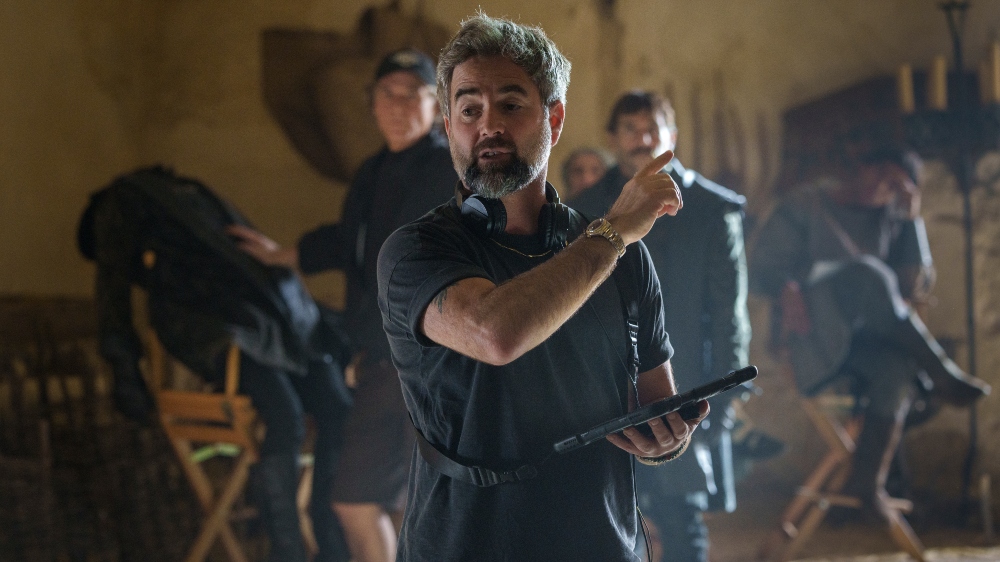
Above the Line: Given how this series explodes across genres and styles, how do you find a baseline to tell the story?
Owen Harris: A big part of the conversation I had after reading the pilot is that you only get to have this much fun if the audience feels like someone’s got a hold of the reins. One of my early thoughts was that there was a slight undercurrent of Monty Python in all the genre surfing.
Betty Gilpin coined the phrase “No Country for Old Looney Tunes,” and those cartoons actually became one of our ingredients. We used their color palette, and we referenced them in chase scenes, in the sort of artificiality beneath some of the heists and hoaxes.
ATL: Did you worry about the audience keeping up with you?
Harris: It’s a tightrope walk. You are conscious of how much you’re going to be able to get away with. I worked on Black Mirror, which had a similar kind of storytelling where you are laying breadcrumbs, teasing the audience for a certain amount of time. But you also have to figure out when enough is enough.
ATL: Here’s an example. Sister Simone meets with Jay (Andy McQueen) in a diner. Sometimes the diner seems normal, and at other times, it looks abandoned or even flooded. I was never sure why.
Harris: What I enjoyed about Mrs. Davis is that it [features] storytelling that allows us to go on a journey with a person of faith, without faith becoming the journey or the story. It was more what we were doing with that diner over the journey.
Obviously, we are dealing with faith here, but we didn’t want it to feel supernatural. At the same time, this diner is not real for anyone apart from Simone. It was a really complex conversation trying to design this place.
So the diner exists for Simone. The character of Jay, or Jesus, is very real. How do we make the viewer understand the slightly different plane this exists on? By introducing aspects like degrading the space as their own story became rockier, but also without that becoming the story — if that makes any sense.
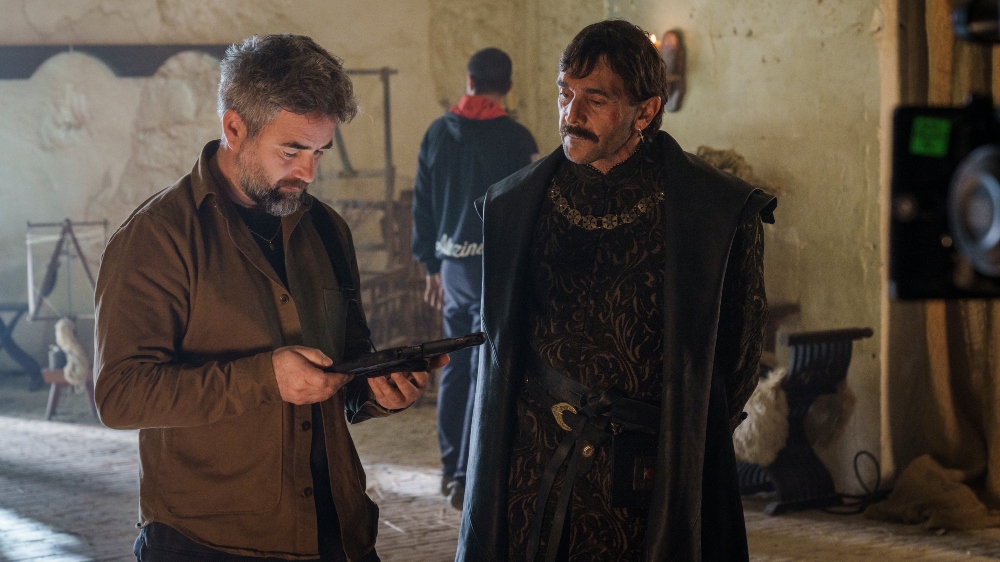
ATL: What Simone sees is what she believes.
Harris: Whenever you read a script where Jesus is characterized, there’s a part of you that thinks, “I don’t want to do something that might be offensive. I just want to be telling a story.” I always felt safe with how Tara and Damon were dealing with these issues. Actually, they opened my eyes to aspects of faith I wasn’t particularly aware of. The idea of a relationship with Jesus was interesting to see dramatized, even though it didn’t end up becoming the drama.
ATL: She tells Jesus at one point, “People should be happy with whatever you give them.” In a way, the series asks if that’s the attitude of the entertainment industry as a whole.
Harris: I think that’s right, but I don’t think we necessarily give you an answer to that. This style of storytelling isn’t designed to say, “This is the side we are on.” It’s to have conversations, [and] to become aware that these conversations exist. This story came out of a period of the pandemic when people were starting to wonder how satisfied they were with the answers they were getting.
ATL: It’s amazing how it predicts the current obsession with AI.
Harris: Black Mirror had that uncanny habit of landing on something that didn’t feel too far away. I call it “near-fi.” Anyone who’s ever used ChatGPT, one of the things you’re struck by is how rapid it is. It’s not how it can answer things, it’s how fast it is.
Tara and Damon latched onto that and thought, “Let’s just take this two steps forward — a nearby future where AI is acting like a religion, a thing that church people go to for answers to what is right or wrong.”
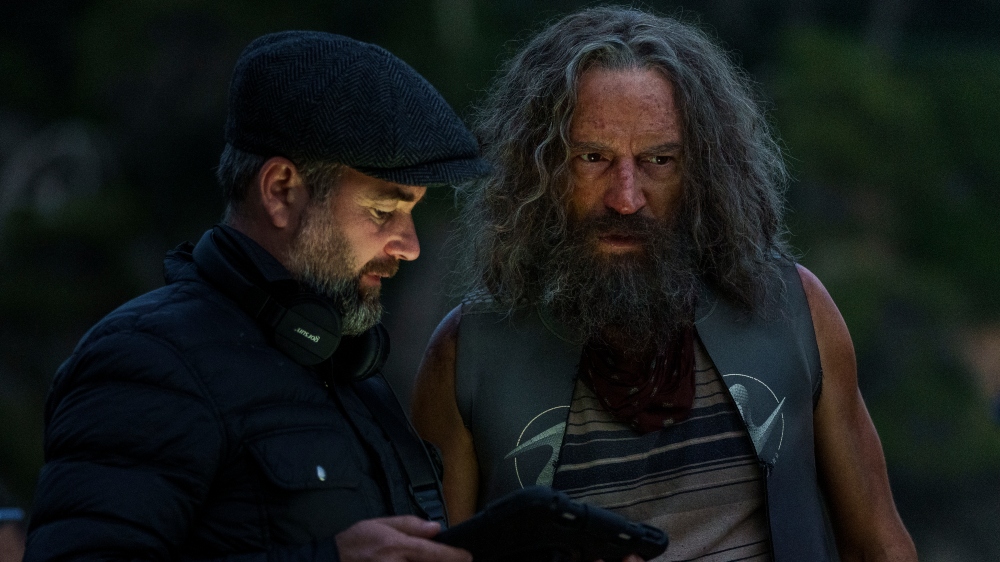
ATL: The series takes a sharp turn in Episode 5, where you introduce new characters, new settings, new storylines, etc.
Harris: It was the episode I had the most trepidation about. Not the least because we’ve built our story on our connection with Simone and Wiley, and now we’re going somewhere else. But that’s what was fun about this series. Every single episode felt like a pilot because each had a brand new challenge that had us scratching our heads thinking, “how are we going to do that?”
We were threading three storylines. We had the Mrs. Davis show, we had this backstory, and we had a commercial that we were trying to explain and pay off in the end.
One of my most satisfying scenes was between Clara [Mathilde Ollivier] and Schrodinger [Ben Chaplin] in the diner where, sadly, it all goes wrong. It allowed that episode to continue these stakes to make you feel like something important was taking place.
ATL: They’re sitting at an outdoor table overlooking the site of a rocket launch. You shot it very carefully, with several set-ups and angles before you retreat behind a window.
Harris: Throughout the series, there are a lot of two-handers — two characters talking to each other. It’s a tribute to the writers that they’re so entertaining, the dialogue so enjoyable and rich. The challenge for a director is, “how do I keep that entertaining?” Or, more importantly, “how do I resist the urge to try to make it more entertaining with the camera because I’m concerned about your attention span?”
You are always juggling the feeling of wanting to do more with the camera, or letting the camera just be there and observe. For me, it was about reading the scene, feeling the energy of the scene, getting the idea of the length that I’m expecting to hold your attention, and then understanding where there might be a dynamic to allow me to switch points of view.
That moment is when Schrodinger accepts Clara’s challenge about the Holy Grail, [and] accepts that she intends to drink from it despite the danger. He says, “Fine,” and at that point, you go over the line and change the conversation. With all the other decapitations and heads being chopped off in the series, I wanted to give this a more respectful distance. Even though underneath everything in this show is a playfulness that’s very weird when you’re dealing with such an emotional scene. Then we cut back to Simone and Wiley and their reactions.
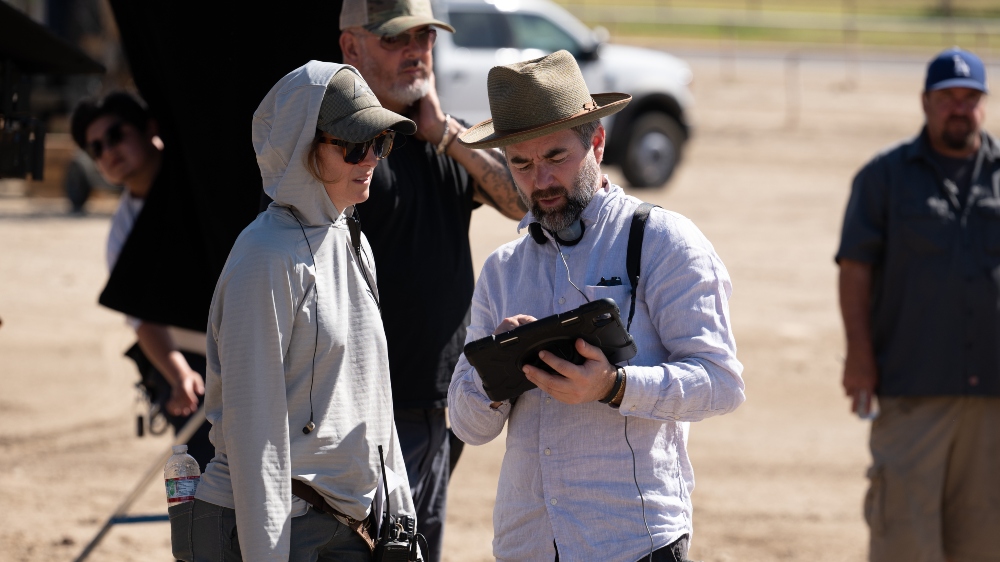
ATL: Were you using multiple cameras?
Harris: No. If I had my way, I’d only shoot with one camera, but quite often the schedule doesn’t allow it. But I always approach a scene as if I’m shooting with one camera. Everything is broken down in terms of when and how and why the camera’s going to move.
We have a set of huge challenges with these scripts, and the only way you’re going to pull it off is to really craft it. You can’t be glib because you could go off the deep end very quickly. Trying to achieve a feeling of absurd and crazy and silly actually takes far more control than just regular drama.
ATL: How big did this production get?
Harris: The opening shot of the pilot had something like 700 extras. That became part of the crazy sneaker commercial. We were shooting that and the “Excalibattle” scene at the same time. That set in itself was jaw-dropping. We not only had two units in Spain going at the same time, [but] the other unit had a sub-unit and then we had a stunt unit, plus our own second block.
So it was a big show — one of the bigger ones shot last year. A big cast, big crews, a huge crew in Los Angeles for the action sequences. Credit to Peacock and Warner Bros. for taking a swing on something completely original, that [wasn’t based on] IP.
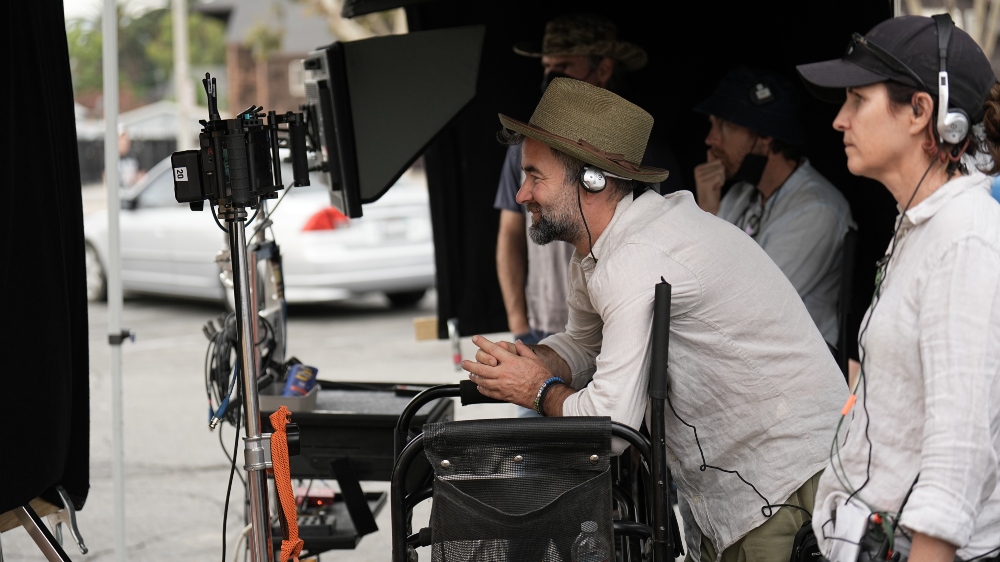
ATL: That opening shot eventually becomes part of a planned Super Bowl commercial.
Harris: I sort of grew up in commercials in the early 2000s — the heyday of massive ads with ridiculous budgets. I imagined the sneaker director demanding they turn Gladiator into a 60-second ad. We were at a huge cathedral. Everything’s in camera. It wasn’t the $85 million the director said she spent on the commercial, but it was a big chunk of the budget. We needed to make it feel hefty and impressive.
ATL: Before we go, give me your take on how AI could affect the writing process.
Harris: It’s very difficult to hold the water back once the dam is gone. Our job right now is to be aware of what we are doing, and not just stumble forward and allow things to happen. I’ve played around with all these ChatGPts and Midjourneys, looking at what they can do. They are great at breaking things and moving ideas very rapidly. We’ve got to be really aware of why we want to do this and what we are going to use it for.
As storytellers, at the end of the day, it’s a human exchange. I hope we understand the subtleties and nuances of what a human exchange is. Hopefully, artificiality won’t take over. We’ve got to be increasingly aware of what we’re investing in with technology because it’s moving at such a rapid pace.
Mrs. Davis is now streaming on Peacock.


